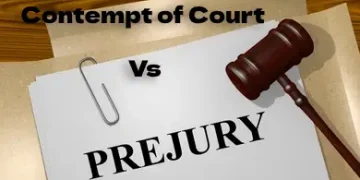In the context of ascertaining facts, gathering evidence, and searching for relevant information, the term ‘investigation’ is defined as an official scrutiny of facts related to a situation or a crime. It can also refer to a scientific or academic exploration of the subject matter or problem. Section 2(h) of the Criminal Procedure Code defines ‘investigation’ as the collection of evidence conducted by a Police Officer or any individual authorized by a Magistrate for this purpose.
Who is authorized to conduct an investigation?
The investigation can be carried out by a police officer or any other authorized individual who is not a Magistrate. It is important to note that individuals being examined or interrogated during the investigation are not required to take an oath.
The typical components of an investigation include:
- Visiting the scene of the event.
- Establishing the facts and circumstances of the case.
- Identifying and apprehending the suspected perpetrator.
- Gathering evidence related to the commission of the offense, which may involve:
- Interviewing various individuals, including the accused, and documenting their statements if deemed necessary by the investigating officer.
- Searching locations and seizing items deemed relevant to the investigation, which will be presented during the trial.
- Forming an opinion on whether the case warrants the accused being brought to trial, and if so, taking the necessary steps to file a charge sheet.
- Summoning and examining individuals who possess knowledge about the circumstances of the case.
- Preparing a site plan detailing the occurrence.
- Arresting the suspected offender.
- Ultimately, submitting the charge sheet or challan under Section 173 of the Criminal Procedure Code (CrPC) to the court.
The investigation encompasses all the proceedings outlined in the Criminal Procedure Code (CrPC) that involve the collection of evidence. It is conducted by either a Police Officer or individuals authorized by a Magistrate. Investigation primarily refers to criminal investigation, which is a statutory process to establish the proof of an offense in a criminal court. The responsibility of investigating a cognizable offense lies with the Police Officer, who possesses the exclusive right to conduct such investigations. The police are not subject to control by courts or any judicial authority during the investigation process, except in cases where the police decide not to investigate, allowing the Magistrate to intervene and direct an investigation or order an inquiry into the case.
The investigation, which is an extensive process of gathering evidence, typically commences with the registration of a First Information Report (FIR) that sets the criminal law and investigation into motion. It is crucial for the investigation to be conducted swiftly, chronologically, and impartially, dispelling any doubts about the investigation’s outcome or the accused’s prima facie guilt. Therefore, it should be executed with care, caution, and adherence to forensic sciences. A competent Police Officer should possess comprehensive knowledge of the science of investigation.
The investigator should diligently collect relevant objects such as blood-stained samples, fingerprints, clothing, and weapons from the crime scene and promptly send them to the concerned court as per the prescribed procedures. The investigator’s promptness and efficiency are crucial for these challenging investigative tasks.
The success of the prosecution heavily relies on a successful investigation that must be formal and unbiased. The chain of events and evidence revealed during the investigation should be continuous, as any missing link can be fatal to the prosecution’s case. The investigation process, which starts with the collection of evidence under Section 156 of the CrPC, concludes with the submission of a report or charge sheet under Section 173 of the CrPC.
While the police cannot investigate non-cognizable offenses, they may do so while investigating cognizable offenses that may be linked to non-cognizable offenses. The police can investigate non-cognizable offenses under the orders of a Magistrate and submit a report. If the investigation cannot be completed within six months, the police can seek permission from the Magistrate or Sessions Judge to continue the investigation, and if refused, file a report based on the progress made thus far.
In cases related to burglaries and housebreaking, investigators should refer to the General Diary Register to identify habitual offenders in the area. Collection and preservation of footprints and fingerprints are essential. The modus operandi of the burglars should be carefully noted, as they often adopt a specific method of breaking locks and doors, committing similar offenses at specific times. In appropriate cases, police dogs from the K9 unit can be employed. The police should take appropriate measures to expedite the case, leading to the arrest of the accused and early recovery of stolen goods and articles.
In prohibition offenses, the immediate actions should include the arrest of the accused, recovery of contraband, vessels used in illicit distilling operations, and fermented waste. The accused should be subjected to medical examination to establish alcohol consumption and intoxication, obtaining a medical certificate, and filing the charge sheet promptly.
Every step of the investigation must be meticulously recorded in the case diary, without raising suspicion of manipulation or interpolation. It should be entered chronologically as the court has the right to review it to ascertain the truth or falsehood of any claims made by the accused regarding arrest, recovery of material objects, etc.
Each step of the investigation should be genuine and true, with no loose ends left untied. The investigation should withstand any normal criticism from the defense. A fair, truthful, and impartial investigation will undoubtedly yield the desired outcome for the prosecution’s success.
Under certain circumstances, the investigation can be refused or further investigation can be ordered. These include:
- Trivial offenses: In cases of minor offenses, where the gravity of the offense is low.
- Clearly civil cases: When the case is evidently of a civil nature and falls outside the realm of criminal investigation.
- Petty thefts: In cases of minor thefts or insignificant value of stolen property.
- Non-cooperation of the injured person: If the injured party does not wish to pursue an inquiry or investigation into the matter.
- Undetectable simple cases: When the case involves simple offenses that are difficult to detect or establish.
- Exaggerated assaults: In cases where the alleged assault is exaggerated or lacks credibility.
- Non-cognizable cases: Non-cognizable offenses, which require a court order for investigation, may be refused.
- Lack of credibility of information: If the information provided is deemed unreliable or lacking credibility.
- Time-barred offenses: When the offense falls outside the statute of limitations, rendering it ineligible for investigation.
Further investigation can be ordered by the Magistrate under Section 173(8) of the Criminal Procedure Code (CrPC). In such cases, when a final report is filed by the investigating officer under Section 173(2) of the CrPC, the first informant must be given notice. The first informant may file a protest petition, which could be treated as a complaint petition in certain circumstances. Based on this, after fulfilling the statutory requirements, the Magistrate may take cognizance and proceed with the material provided by the investigating agency. Additionally, the Magistrate or superior courts can also order further investigation if flaws or inadequacies are identified in the initial investigation.
Further investigation can be conducted by the police even after the charge sheet has been filed. This is a statutory right of the police to carry out additional investigation if deemed necessary.
Re-investigation and further investigation are distinct processes within the realm of criminal investigation. Further investigation is initiated under Section 173(8) of the Criminal Procedure Code (CrPC) after the investigation is considered complete, and a final report is submitted under Section 173(2) of the CrPC.
Re-investigation, on the other hand, involves starting the investigation afresh. The CrPC does not explicitly address the process of re-investigation. Re-investigation is prohibited without permission, while further investigation is permissible.
Re-investigation nullifies the previous investigation conducted. Typically, the High Court or Supreme Court reserves the right to order a fresh investigation if it deems the initial investigation to be flawed.
Regarding the power of the court on investigation, further investigation, and re-investigation under Article 226 of the Indian Constitution, the High Court can issue appropriate directions to investigate, further investigate, or re-investigate if it determines that the concluded investigation was done in bad faith.
In conclusion, the success of an investigation lies in uncovering the sequence of events with solid evidence, ensuring there are no missing links, and leading to a successful prosecution of the perpetrator. The investigation methods should adhere to prescribed procedures and comply with the law. It should be conducted promptly, impartially, and without bias. Documenting each step of the investigation helps in future investigations or re-investigations. The objective of the investigation is to identify and analyze the issue at hand while presenting the findings in a court of law.

















